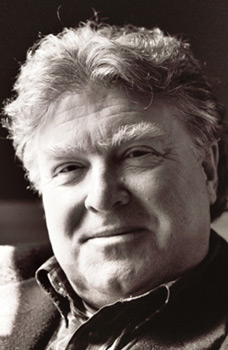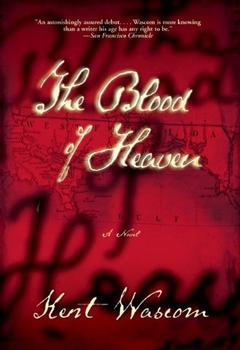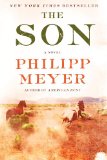Summary | Excerpt | Reviews | Beyond the book | Read-Alikes | Genres & Themes | Author Bio

 The plot of Far Bright Star is a relatively simple one, and for that reason you probably won't find much detail about it in reviews. It's so straightforward that little information about it can be relayed to potential readers without injecting some sort of spoiler. Really, though, this isn't a book that one reads for its plot; its true appeal is the quality of the author's writing.
The plot of Far Bright Star is a relatively simple one, and for that reason you probably won't find much detail about it in reviews. It's so straightforward that little information about it can be relayed to potential readers without injecting some sort of spoiler. Really, though, this isn't a book that one reads for its plot; its true appeal is the quality of the author's writing.
Far Bright Star compares very favorably to Cormac McCarthy's Border Trilogy. Olmstead's narrative, like McCarthy's, is beautiful and spare, almost poetic, and his style is utterly unique. He skillfully paints vivid pictures of the American Southwest at the turn of the century, conveying the sights, sounds and even the smells of the place with tremendous accuracy. More importantly, the author conjures up a perfect sense of atmosphere. He transports his readers back in time to the New Mexican badlands, allowing them to feel like they're right there, riding across the rocky desert, witnesses to its austere and ever-changing beauty.
"For months they'd ridden the stony trails. They'd searched the scattered ranges and barren hills, the dry flat basins, dust and rock to no avail. Every trail they cut was the same story. The bandits were to be found in the next high valley, the next mountain peak, a cave that did not exist. A day ago, an hour ago. The orders they carried were catch in the act and kill on the spot, but the one they sought was as if a wind passed by and his trail ended and cold and all sign disappeared. The bandits knew this broken land and were used to poor food and poor water. They were used to starving."
The story is told from the viewpoint of Napoleon Childs, a veteran cavalryman nearing the end of his career. The character's rough outline is stereotypical (the grizzled, knowledgeable old soldier), but Olmstead gives him a three-dimensionality that breathes a new life into this stock character. He is finely rendered; one senses his hard-won wisdom as well as his bone-tired weariness of dealing with the futility of his mission and with the rabble of young, foolish men around him.
Although Far Bright Star has become one of my favorite books, it will not appeal to all readers. First, the author's writing style may annoy as many as it attracts, as it's so atypical of most current prose; some may consider it genius while others will think it overly affected. More importantly, the book contains scenes of intense brutality. I rarely have any difficulty reading about people inflicting harm on others; in Far Bright Star, though, some fairly horrific events are depicted so graphically that I found them truly disturbing, with long-lasting afterimages.
Far Bright Star is not an easy book; it carries a huge emotional wallop that can leave the reader feeling drained by the novel's end. The author also poses a number of ethical questions within the narrative for which he provides no answers. Readers will likely find themselves revisiting the book's moral ambiguities for some time after they complete it. Although its violence will likely preclude it from becoming a widely read book club selection, it is certainly worthy of discussion and debate.
About the Author
 Robert Olmstead is the author of six previous books. Coal Black Horse was the winner of the Heartland Prize for Fiction and the Ohioana Award, was a #1 Book Sense Pick, and was a Borders Original Voices pick. Olmstead is the recipient of a Guggenheim fellowship and an NEA grant, and he is a professor at Ohio Wesleyan University.
Robert Olmstead is the author of six previous books. Coal Black Horse was the winner of the Heartland Prize for Fiction and the Ohioana Award, was a #1 Book Sense Pick, and was a Borders Original Voices pick. Olmstead is the recipient of a Guggenheim fellowship and an NEA grant, and he is a professor at Ohio Wesleyan University.
Interesting Links
http://www.mexconnect.com
http://latinamericanhistory.about.com
Image: Pancho Villa, undated
![]() This review was originally published in The BookBrowse Review in July 2009, and has been updated for the
June 2010 edition.
Click here to go to this issue.
This review was originally published in The BookBrowse Review in July 2009, and has been updated for the
June 2010 edition.
Click here to go to this issue.

If you liked Far Bright Star, try these:

by Kent Wascom
Published 2014
A remarkable portrait of a young man seizing his place in a violent new world, a moving love story, and a vivid tale of ambition and political machinations that brilliantly captures the energy and wildness of a young America where anything was possible.

by Philipp Meyer
Published 2014
Part epic of Texas, part classic coming-of-age story, part unflinching portrait of the bloody price of power, The Son is an utterly transporting novel that maps the legacy of violence in the American West.
Censorship, like charity, should begin at home: but unlike charity, it should end there.
Click Here to find out who said this, as well as discovering other famous literary quotes!
Your guide toexceptional books
BookBrowse seeks out and recommends the best in contemporary fiction and nonfiction—books that not only engage and entertain but also deepen our understanding of ourselves and the world around us.